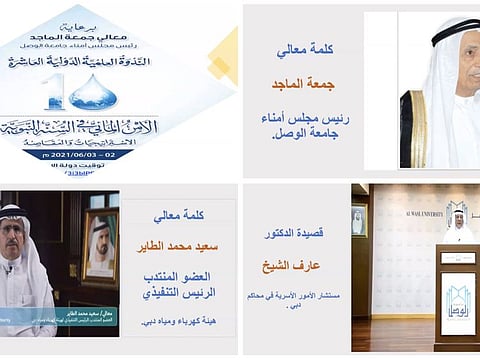Dubai has sustainable water resources, says Dewa chief
Dubai enhances water resources, rationalises consumption and employs innovation

Dubai: Saeed Mohammed Al Tayer, managing director and CEO of Dubai Electricity and Water Authority (DEWA), has assured that Dubai has a “comprehensive approach to ensure sustainability of its water resources”.
Al Tayer made the statement during his keynote address to the 10th International Symposium of the Honourable Hadith, organised virtually by Al Wasl University under the theme ‘Water Security in the Prophet’s Sunnah: Strategies and Objectives’.
He noted that in line with the Dubai Integrated Water Resource Management Strategy 2030, the emirate has a comprehensive approach to ensure sustainability of its water resources with focus on enhancing resources, rationalising consumption, and using innovative solutions.
Al Tayer said: “Water is the basis of life. Allah Almighty says in the Holy Quran, ‘We made from water every living thing.” Prophet Mohammed (PBUH), urged us to rationalise the use of water and to give it to the needy to be rewarded by Allah.”
Water security
Al Tayer noted: “According to a report issued by Unicef and the World Health Organisation (WHO) in 2019, one in three people globally do not have access to clean drinking water. Every year, 297,000 children under five years old die due to diseases linked to inadequate water, sanitation and hygiene.”
Water security is one of the biggest challenges worldwide. In 2016, the World Economic Forum listed ‘Water Crises’ as one of the top global risks affecting the planet. In support of the sixth goal of the United Nations Sustainable Development Goals (SGDs) 2030 to ‘ensure access to water and sanitation for all’, the UAE has launched the Water Security Strategy 2036, to ensure sustainable access to water under both, normal as well as emergency conditions, and address long-term water security challenges.
Water-scarce region
According to world data, the Middle East and North Africa is the most water-scarce region in the world, with more than 60 per cent of the region’s population living in areas with high or very high surface water stress, compared with a global average of about 35 per cent.
“The UAE faces water-related challenges such as the scarcity of fresh natural water resources, the depletion of groundwater, and the high demand for water. That’s why, the wise leadership attaches great importance to preserving water, its sensible use, and security,” Al Tayer underlined.
“The UAE supports international efforts to provide drinking water by encouraging research institutions, individuals, and innovators from around the world to develop sustainable and innovative solutions to desalinate water using solar power,” he added.
Water aid
Al Tayer emphasised: “In line with the vision of His Highness Sheikh Mohammed bin Rashid Al Maktoum, Vice-President and Prime Minister of the UAE and Ruler of Dubai, that the best charity is giving water, we develop sustainable solutions to provide clean and potable water, and to provide a water safety-net for the needy, lower-income families and developing communities to achieve economic and social development.”
He noted the UAE Water Aid Foundation (Suqia UAE), under the umbrella of the Mohammed bin Rashid Al Maktoum Global Initiatives, provides safe drinking water to needy communities in many countries of the world. Children in rural areas worldwide spend long hours every day looking for water, which results in losing access to education and development.
UAE’s water reserve
Meanwhile, the installed capacity of Dewa has reached 490 million imperial gallons of desalinated water per day (MIGD) — thanks to its state-of-the-art infrastructure, innovation and planning.
According to Al Tayer, Dewa has achieved a new world record for the lowest water levelised tariff of 0.277 US dollars (Dh1.01) per cubic metre for its 120 MIGD Hassyan SWRO Plant. The project is Dewa’s first Independent Water Producer model project. “The Demand Side Management Strategy aims to reduce water usage by 30 per cent by 2030. In this regard, Dewa has achieved significant results. It managed to reduce groundwater usage for drinking purposes from 100 per cent in the 1980s to just 0.4 per cent today,” Al Tayer said.
Sustainable solution
Al Tayer explained that Dewa follows three pillars to ensure the sustainability of water production. These are based on using clean solar power to desalinate seawater using Reverse Osmosis (RO) technologies, which uses less energy. Excess water is then stored in aquifers and pumped back into the water network when needed.
“Currently, Dewa is implementing a project to store 6 billion gallons of water in aquifers that can be retrieved when needed. This will provide the emirate with a strategic reserve of over 50 million gallons of desalinated water per day, in emergencies, for 90 days, while ensuring the quality of the stored water remains unaffected by external factors,” he added.
By 2030, all desalinated water will be produced by a mix of clean energy that uses both renewable energy and waste heat. This will allow Dubai to exceed global targets for using clean energy to desalinate water.









